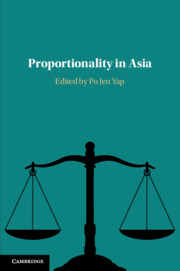Book contents
- Proportionality in Asia
- Proportionality in Asia
- Copyright page
- Contents
- Figures
- Tables
- Contributors
- Acknowledgments
- Abbreviations
- Introduction
- Part I Structured Proportionality
- Part II Anemic / Ad Hoc Proportionality
- 5 Proportionality in Malaysia
- 6 Judicial Review of Restrictions on Constitutional Rights in Japan
- 7 Against the Currents
- 8 Manifest Disproportionality and the Constitutional Court of Thailand
- Part III Doctrinal Equivalents of Proportionality
- Conclusion
- Index
5 - Proportionality in Malaysia
New Dawn or “Merely Obiter”?
from Part II - Anemic / Ad Hoc Proportionality
Published online by Cambridge University Press: 18 September 2020
- Proportionality in Asia
- Proportionality in Asia
- Copyright page
- Contents
- Figures
- Tables
- Contributors
- Acknowledgments
- Abbreviations
- Introduction
- Part I Structured Proportionality
- Part II Anemic / Ad Hoc Proportionality
- 5 Proportionality in Malaysia
- 6 Judicial Review of Restrictions on Constitutional Rights in Japan
- 7 Against the Currents
- 8 Manifest Disproportionality and the Constitutional Court of Thailand
- Part III Doctrinal Equivalents of Proportionality
- Conclusion
- Index
Summary
The tortuous development of proportionality in Malaysia has taken place in five "waves" of cases. In the first wave, led by Justice Gopal Sri Ram, the Court of Appeal (Malaysia’s second-highest court) laid the foundations of proportionality. However, the Court of Appeal failed to establish proportionality clearly as a general principle underpinning all fundamental rights provisions. Nor did it lay down a clear example of how proportionality was to be applied rigorously. In the second wave, the Federal Court (Malaysia’s highest court), again led by Justice Gopal Sri Ram, did not rectify these deficiencies. It alluded to the possible applicability of the structured Privy Council’s de Freitas proportionality test, but ultimately failed to apply this test. As a result, the third wave of cases (after Justice Gopal Sri Ram’s retirement) was marked by judicial inconsistency in the application of the proportionality doctrine, culminating in the Court of Appeal’s dismissing the entire concept of proportionality as “merely obiter” in Malaysian law. In the fourth wave of cases, the Federal Court rehabilitated proportionality, clarifying the precise constitutional basis for the doctrine, and eschewing a structured test in favour of applying proportionality in a flexible, yet nuanced, manner. But the Court of Appeal continued to neglect proportionality, prompting the Federal Court to renew its call for proportionality and make proportionality more robust in the fifth wave of cases. Ultimately, while the developments in the fifth wave are promising, only time will tell whether the lower courts will prove willing and capable to apply proportionality rigorously and consistently, instead of continuing to misunderstand, misapply, or simply ignore the Federal Court’s authoritative guidance on proportionality.
- Type
- Chapter
- Information
- Proportionality in Asia , pp. 105 - 139Publisher: Cambridge University PressPrint publication year: 2020



